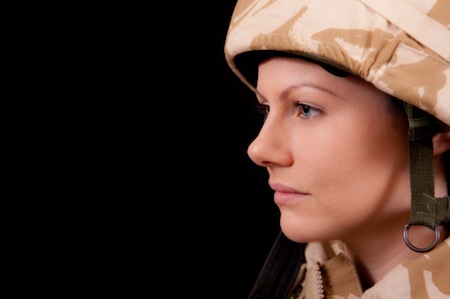Todd: So Meg, I thought we would talk a little bit about the military. Now, you were actually in the military.
托德:梅格,我们谈谈军队吧。你曾在军队服役。
Meg: Yes. I was actually in the Army National Guard. So I enlisted when I was 17. In America, in the National Guard, each state can have kind of different rules, or different requirements. And so, in Indiana, you can enlist when you are 17 with parental permission. So I did that.
梅格:对。我曾在美国陆军国民警卫队服役。我17岁入伍。在美国,各州对国民警卫队的规定和要求都不相同。在印第安纳州,得到父母的许可,17岁就能入伍。我就是这样做的。
Todd: Wow. Seventeen is really young age.
托德:哇哦。17岁还很小呢。
Meg: Yeah. And it sort of happened really quick. I mean, I was a junior in high school and I got a call from a recruiter. And at first, I was really against it but then in Indiana, if you enlist and you serve your time, they'll pay your college tuition if you go to a state college. So Indiana has Purdue, and I was interested in going to Purdue anyway, so it seemed like a good idea.
梅格:对。事情发生得非常快。我当时是高中生,有一天我接到了征兵人员打来的电话。一开始,我不想去军队服役,不过依据印第安纳州的规定,如果你入伍并服完兵役,那之后你念州立大学的话,他们会支付你的大学学费。而普渡大学在印第安纳州,我想念普渡大学,所以这看起来是个不错的方法。
Todd: That's fantastic. So how long were you in the service?
托德:那真不错。你服了几年兵役?
Meg: I was in for six years all together. That was the minimum commitment. So I could have done more but I was ready to, maybe try some other things after that time.
梅格:我一共服役6年。依据规定,那是最短的服役时间。我可以继续服役,可是我想尝试做其他的事情。
Todd: Did it go by fast?
托德:服役的时间过得快吗?
Meg: Looking back, it definitely did. I think, there are different stages that went by slow or fast. Like when I was in actual basic training, when you're in it, it was super slow. Like you're counting on the hours every day because you're just desperate to finish and get out and get back to your family. And I was, you know, 17, so it's a little different. But now looking back, like, I can't believe it was a full six years, and now it's so many years past that already. So yeah, I guess, it did go by fast overall.
梅格:回想一下,真的非常快。有的时候时间过得很快,有时过得很慢。我认为在接受基础训练时,时间过得非常慢。我几乎每天都是数着时间过的,因为我非常想结束训练,回到家人身边。当时我只有17岁,可以说有时快有时慢。现在回想一下,我不敢相信6年就那样过去了,而现在距离那时又过了好多年了。总体来说,时间过得很快。
Todd: Yeah, that's great. So what was it like being a woman in the military?
托德:好,那很好。女生在军队服役是什么感受?
Meg: It was – well, I served in a unit – I was a medic. And so, my unit, a medical unit, naturally has more women. The ratio is closer to 50-50 men and women, which isn't – at least that time wasn't – I don't have the current statistics, but it isn't that kind of ratio for the Army as a whole or the military as a whole. And so, for me there was – I was with a lot of other women also when I was serving. But for me personally, there were definitely challenges especially when I was first in basic training like I definitely felt personal pressure to try to keep up with the guys. With everything whether it's, you know, physically being able to lift and carry these heavy boxes and whatever. You know, you have the same requirements that you have to do. And you never want to be the weak link. And I think some other women, maybe suffered a little more because they couldn't keep up quite as well. And so that can be a little difficult. But maybe I'm naturally a bit more suited for those kinds of things. So I did okay but I definitely wanted to and tried hard to keep up with the physical aspect which isn't as easy sometimes for women.
梅格:我是医疗兵。医疗队里女生很多。男女兵的比例接近50对50,虽然我没有具体的数据,不过至少在当时,整体来说陆军的男女比例并不是这样的。所以,我在服役时,周围有很多女兵。就我个人来说,当然极具挑战性,尤其是基础训练期间,当时我要努力跟上其他人,我感觉压力很大。要能举重物,拿那些特别重的箱子等等。每个人的要求都是一样的。你绝对不想成为最差的那个。我认为其他女生可能更痛苦,因为她们也跟不上。这很难做到。不过也许我天生就适合军队。所以我还好,而我当然想努力训练,在身体方面达到要求,这对女性来说并不简单。
Todd: Well, that's interesting. So you do look pretty fit, so you must have been really fit back in the day.
托德:嗯,这很吸引人。你看上去健康又强壮,服役时你一定非常健康。
Meg: Yeah, I think. Yeah, especially basic training because you're never like not running. Anytime you're walking somewhere, you're just running, running, running, like they make you run everywhere. And you get like 5 minutes to eat breakfast and lunch, and dinner. Every time, you have to eat it so fast. And then you're doing all this physical training, and then going through obstacle courses, and carrying heavy packs and carrying your weapon round. Yeah. So that was probably the most fit I've ever been. I'm definitely not that now.
梅格:我想是这样的。特别是基础训练期间,因为基本上一直在跑。无论你要去哪里,都是跑着去的,他们会让你跑去各个地方。早餐、午餐和晚餐都要在5分钟内吃完。所以,每次都要吃得非常快。还要进行体能训练,障碍训练,一直带着厚重的背包和武器。所以那时可能是我最健壮的时期。现在我肯定没有那时强壮。
Todd: Right. So if you had a daughter, would you recommend that she goes in the military, or would you recommend other women to join the military?
托德:好。如果你有女儿,你会建议她去参军吗?或者说你会建议其他女性参军吗?
Meg: I would not recommend it. I guess, I don't go around telling everyone, "Oh, you should just join the military." But I think if someone – if there is a woman who is interested in it or thinking about it, I would definitely – for me, I mean, it worked out great. There are a lot of like leadership and personal character qualities that I was really able to develop during my time that have continued to benefit me now. And so, for a woman who is interested, I would definitely say, "Go for it."
梅格:我不会建议她们参军。我想,我不会和别人说:“哦,你应该去参军”。不过,如果有女生对军队感兴趣,或者想参军,那我一定会建议她们去军队,就我个人来说,军队生活很美好。我在服役期间养成了领导力和优秀的品德,现在这些特质依然使我受益。所以,如果有女生想参军,我一定会建议她们“去试试”。
Todd: Awesome. Thanks. Thanks, Meg.
托德:太棒了。谢谢,谢谢你,梅格。
Meg: Yeah.
梅格:不客气。

译文属可可原创,仅供学习交流使用,未经许可请勿转载


